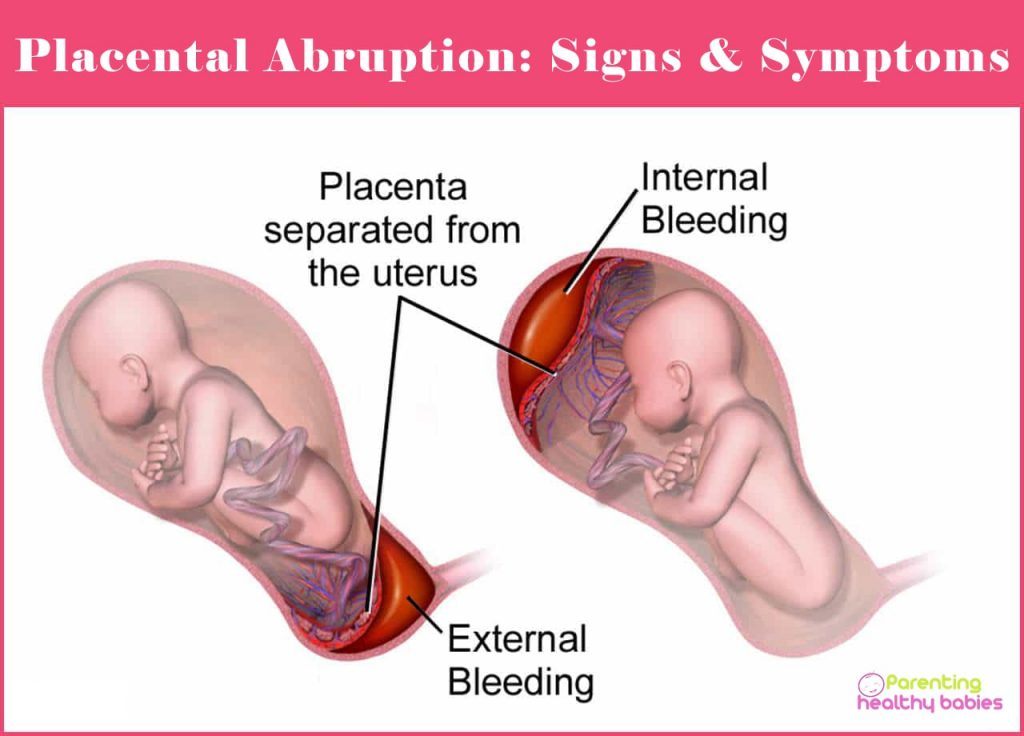Placental abruption during pregnancy can be very dangerous as it cuts off the supply of nutrients to your unborn child and put its life in way of harm. Listed below are a few signs and symptoms of placental abruption that you must be aware of. If you suffer from any of these symptoms, be sure to rush to your midwife or doctor.
Signs and Symptoms of Placental Abruption
A placental abruption refers to a serious condition wherein the placenta separates from the uterus, either completely or partially, before the birth of the baby. This condition can deprive the baby of various nutrients and oxygen and lead to dangerous consequences for the mother as well as the child. In addition, placental abruption also increases the risk of developmental problems in the baby. It can also be a cause for premature birth or stillbirth.
Signs and Symptoms
Generally, you may experience some vaginal bleeding, ranging from a small amount to an obvious and sudden gush. However, sometimes the blood might stay in the uterus behind the placenta, thus making the abruption go unnoticed. Most of the women may experience some back pain or uterine tenderness.
Usually, placental abruption occurs suddenly and can endanger the baby and the mother if left untreated. It is more likely to occur in the last trimester of pregnancy, specifically in the last few weeks before delivery.
Common signs and symptoms of placental abruption include:
- Firmness in the abdomen or uterus
- Uterine contractions, usually coming one right after another
- Uterine tenderness
- Back pain
- Abdominal pain
- Vaginal bleeding
Usually, back pain and abdominal pain begins suddenly. The amount of vaginal bleeding can vary to a great extent. It is not necessary for the bleeding to correspond to the extent of separation if placenta from the uterus. It is quite possible for the blood to get trapped inside the uterus. For this reason, even with a severe placental abruption, there might be no visible bleeding.
In many cases, placental abruption develops quite gradually, known as chronic abruption, which can lead to intermittent, light vaginal bleeding. Adding further, the fetus might not grow properly and as quickly as expected. You may also have low amniotic fluid or similar other complications.
Many a times, it is not necessary for the bleeding to flow from the uterus. The practitioner will examine the cervix and vagina to check if the bleeding is due to an infection, a cervical polyp, a laceration, or some other reason as well. In addition, she will also check to see if your cervix is dilating or effacing, which can disrupt small veins and result in some bleeding.
If you are Rh negative and experience any vaginal bleeding in the second or third trimester, you may require a shot of Rh immune globulin, unless the biological father is also Rh negative.
It becomes imperative to call the practitioner immediately if you notice any of the above mentioned signs and symptoms.
Who is at the Risk of Placental Abruption?
Although the cause of placental abruption is not known in many cases, the condition is more common in women who:
- Have chronic hypertension, gestational hypertension, or preeclampsia
- Have had an abruption in a previous pregnancy (the risk raises to a higher level if you have had an abruption in two or more pregnancies)
- Have a blood clotting disorder
- Have excessive amniotic fluid
- Have their water break prematurely
- Are involved in an accident, specifically a car accident, are assaulted (with blows to the abdomen, or have other trauma to the abdomen
- Are carrying multiples (abruption is common especially just after the first baby is delivered)
- Have had many babies or are older (the risk increases gradually with age)
- Smoke tobacco or use cocaine or methamphetamines, or indulge in excessive alcohol intake
- Have fibroids or any other uterine abnormality
Consequences of Placental Abruption
If your due date is approaching and you experience placental abruption, you may require delivering the baby at the earliest as a consequence, even if it is a minor abruption. This is due to the fact that the placenta could separate further at any point of time. However, in case of heavy bleeding or if the baby is not getting sufficient oxygen, you may have to undergo a C-section.
Furthermore, in case of a small amount of bleeding that is suspected to come from a minor abruption, while you and the baby are completely fine, you may be allowed to labor, as long as you are in a hospital where an emergency C-section can be performed at the beginning of the problem.
